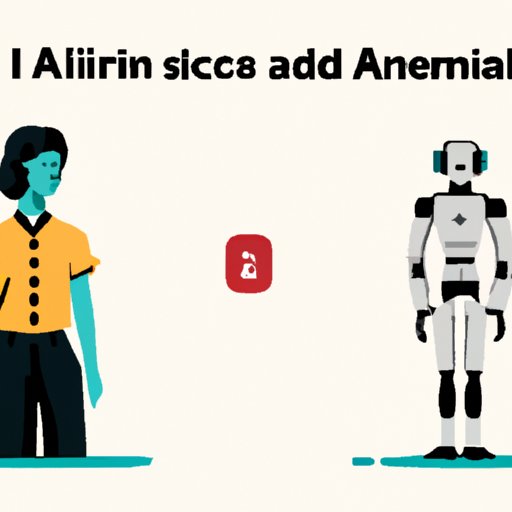Introduction
Artificial intelligence (AI) has become a major focus in the tech world, with many companies investing heavily in research and development. But what is AI and how does it work? This article will provide an in-depth exploration of AI, from its definition and comparison to human intelligence to its potential applications, current technology, ethical considerations, and recent developments. Read on to learn more about the benefits and challenges of intelligence AI.
Definition of Artificial Intelligence (AI)
The term “artificial intelligence” was first coined by John McCarthy in 1956 and has since been defined as “the science and engineering of making intelligent machines.” AI encompasses a variety of technologies such as machine learning, natural language processing, and computer vision, which allow machines to perform tasks that traditionally required human intelligence. AI can be used for a variety of purposes, including automation, robotics, healthcare, business, finance, education, and more.
Overview of Benefits and Challenges of AI
AI can bring many benefits to businesses and individuals alike. It can help automate tedious and time-consuming tasks, allowing humans to focus on higher-level activities. AI can also be used to analyze large amounts of data quickly and accurately, helping to make better decisions. Additionally, AI can be used to improve customer experience, increase productivity, and reduce costs.
However, there are also some potential challenges associated with AI. For example, AI can be difficult to implement and maintain, requiring significant resources and expertise. Additionally, AI can be prone to errors and may need to be monitored closely. Finally, ethical concerns must be taken into account when using AI, especially when it comes to privacy, algorithmic bias, and autonomous machines.

Comparisons between Human and AI Intelligence
Though AI has come a long way, it still cannot replicate human intelligence. AI lacks the ability to think abstractly, creatively, and intuitively, which are essential skills for problem solving. Additionally, AI is unable to process emotions or understand context like humans can. AI also relies heavily on data and algorithms, which can limit its ability to make decisions outside of those parameters.
Despite these differences, AI can actually enhance human intelligence. By automating mundane tasks, AI can free up humans to focus on more complex and creative endeavors. Additionally, AI can help humans to analyze large amounts of data quickly and accurately, allowing for more informed decision-making. Finally, AI can provide valuable insights into customer behavior, helping businesses to better understand their customers.
Potential Applications of AI
AI has many potential applications across a variety of industries. Automation and robotics are two areas where AI can be particularly useful. For example, AI can be used to automate certain tasks, such as sorting through large amounts of data or managing inventory. Additionally, AI can be used to control robots, allowing them to complete complex tasks without human intervention.
AI can also be applied to healthcare. AI-powered algorithms can help to diagnose diseases and predict outcomes. Additionally, AI can be used to monitor patient health and detect anomalies. AI can also be used in business and finance, providing insights into customer behavior and helping to optimize processes. Finally, AI can be used in education, aiding in personalized instruction and helping students to better understand complex concepts.
Current AI Technology
There are several types of AI technology currently available. Machine learning is one of the most common types of AI, and it uses algorithms to identify patterns and make predictions based on data. Natural language processing (NLP) is another type of AI that enables machines to understand and respond to human language. Finally, computer vision is a type of AI that enables machines to recognize objects in images and videos.
Ethical Considerations of AI
When using AI, it is important to consider the ethical implications. Privacy is a major concern, as AI systems can collect and store large amounts of personal data. Additionally, AI can introduce bias into decision-making if the algorithms are not properly designed. Finally, autonomous machines can raise questions about who is responsible for any harm caused by their actions.
In order to ensure ethical use of AI, it is important to create guidelines and regulations. Companies should take steps to ensure that data is collected and stored securely, and that algorithms are regularly tested for accuracy and fairness. Additionally, companies should consider the potential impacts of autonomous machines and ensure that they are held accountable for any harm caused.
Recent Developments in AI
AI research is constantly evolving, with new developments being made every day. Recent advancements include improved natural language processing capabilities, increased accuracy in image recognition, and more advanced machine learning algorithms. Additionally, many companies have released AI products, such as chatbots and virtual assistants, that are designed to make everyday tasks easier.
There has also been an increase in the number of AI startups. These companies are focused on creating new technologies and products that leverage AI to solve real-world problems. Many of these startups are receiving significant investments from venture capitalists, indicating that AI is becoming increasingly important in the tech world.
Conclusion
In conclusion, artificial intelligence is a rapidly growing field that has the potential to revolutionize many industries. Though AI differs from human intelligence in many ways, it can still be used to enhance human capabilities. AI can be applied to automation, robotics, healthcare, business, finance, and education, among other areas. Additionally, there are several types of AI technology currently available, and ethical considerations must be taken into account when using AI. Finally, AI research is constantly evolving, with new developments and products being released every day.
(Note: Is this article not meeting your expectations? Do you have knowledge or insights to share? Unlock new opportunities and expand your reach by joining our authors team. Click Registration to join us and share your expertise with our readers.)
